
Some time ago I wrote about the
the state of GRUB2
and a milestone on getting it boot my Apple PowerBook G4 without manual
intervention. More than a year later, GRUB2 has changed and improved a lot,
as the community keeps growing and patches and ideas are continously being
posted.
Some months and commits after my previous post, GRUB broke again on
Apple OpenFirmware and I'd get dropped to OF console, the amount of
commits since the last known working version and the current SVN was quite
big, and although I was able to narrow it to a few suspicious changes, I had
no time to bisect it properly, and sadly I had to go back to
yaboot for a while.
But procrastinating sometimes helps, and when I should have been writing
and studying, on December I gave GRUB a new try on my laptop to see if a few
important changes to memory allocation would have changed anything. And it did!
So after fighting quite a few problems, I was able to
report partial success
to
grub-devel.
Again, getting GRUB installed correctly was a bit challenging and needed
some hackery, due to incorrectly generated
device.map, and the
linux module mysteriously not getting loaded. Luckily, Michel D nzer found out
that this was due to a bug in sort ordering in the HFS module, which broke
the lookup of files with underscores like
_linux.mod, and for
which he posted a possible fix by taking Linux's table of character
ordering, which is a blob of hex values.
GRUB developers didn't seem too happy about applying the patch:
they argument that a blob like that should be well documented or written
in some other more readable way, and there's a possible problem with the mix
of Linux GPLv2 and GRUB GPLv3+ codebases, if a table of data like what Michel
posted is actually copyrightable. The discussion ended up dying and nothing
was done... until Pavel Roskin
picked it up
weeks later and posted a new patch, based on
hfsutils GPLv2+
code, which addressed these issues. The new patch seems to have a few issues,
which makes it fail as before, but hopefully it'll be fixed soon.
Additionally, I wasn't able to boot using UUIDs as the search commands
fails to detect the correct boot device on my system (but not on Michel's), so
I had to disable that in
/etc/default/grub.
To workaround the linux module loading bug while the patch is fixed,
I just added this ugly hack to
/etc/grub.d/09_local_prelinux:
#! /bin/sh -e
# Work-around for bugs in the hfs module which makes the load of
# linux.mod fail.
cat << EOF
insmod (hd,3)/usr/lib/grub/powerpc-ieee1275/_linux.mod
insmod linux
EOF
This is enough to get the
initrd and
linux
commands available. However, update-grub will still add
search
commands to your menu entries even if you disabled UUID support; I can't
understand why, but I know it breaks on my PowerBook due to some OF rarety.
Just removing the line from the menu entry will leave me with a working
config that boots without any manual editing at GRUB prompt.
The latest GRUB snapshot in Debian fixes the device.map issue, but adds
one last
issue:
update-grub will fail due to some gfxterm detection code, a workaround is
to replace an
exit 1 with
exit 0 when this happens
in
/etc/grub.d/00_header.
On the weird architectures front, it's worth noting that this month
Dave Miller popped up on the list and started posting patches to fix the rotten
SPARC port, and I think it's safe to assume that it'll be on an usable state
really soon. Impressive!
 This post and the next to come are about a project I'm doing at work that I've
called The Freaky Wall.
The project has its origins on the idea that using multiples technologies is
better for security; almost all the servers I use are running Debian
GNU/Linux and use
This post and the next to come are about a project I'm doing at work that I've
called The Freaky Wall.
The project has its origins on the idea that using multiples technologies is
better for security; almost all the servers I use are running Debian
GNU/Linux and use  Two weeks ago,
Two weeks ago, 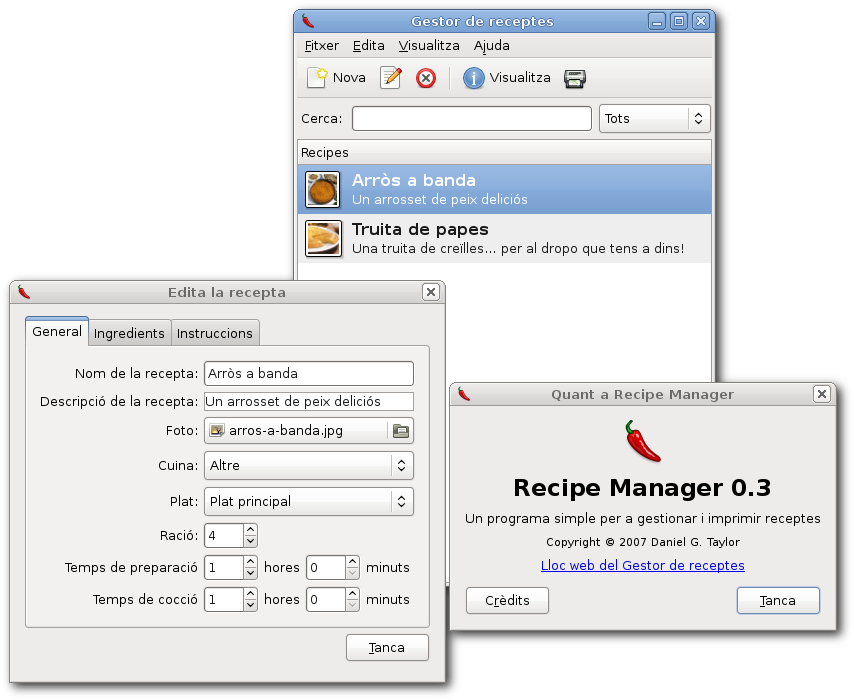
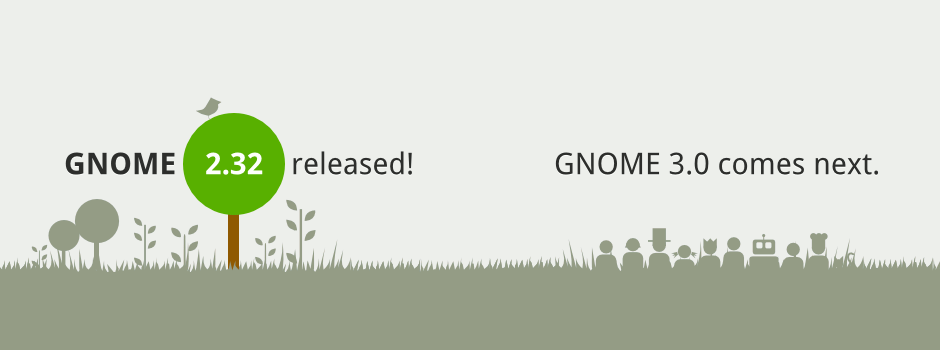
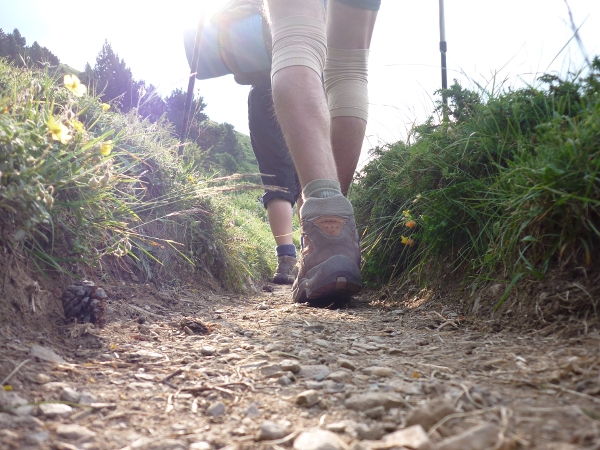 We managed to complete this challenge without facing major problems or
pains, and after the first five our six days, our legs seemed to have
gotten used to the daily effort and it started to be easier and easier.
Our morale kept growing as days passed and we advanced east. When I
started walking on a cold and rainy morning in Hondarribia, after barely
no rest in the night bus to Ir n, I thought for myself that it was
improbable that we'd manage to get anywhere near Catalunya, that one of
us would get injuried way before, or we'd just give up and go for the easy
beach vacation in the Basque Country.
We managed to complete this challenge without facing major problems or
pains, and after the first five our six days, our legs seemed to have
gotten used to the daily effort and it started to be easier and easier.
Our morale kept growing as days passed and we advanced east. When I
started walking on a cold and rainy morning in Hondarribia, after barely
no rest in the night bus to Ir n, I thought for myself that it was
improbable that we'd manage to get anywhere near Catalunya, that one of
us would get injuried way before, or we'd just give up and go for the easy
beach vacation in the Basque Country.
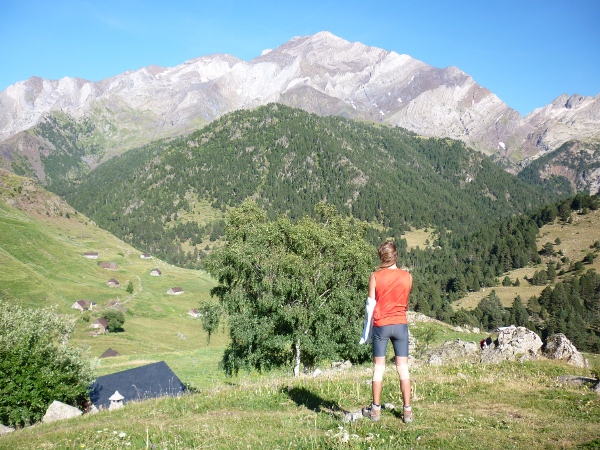
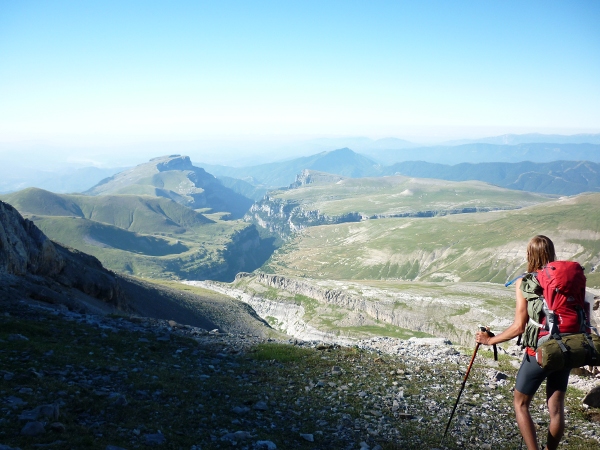
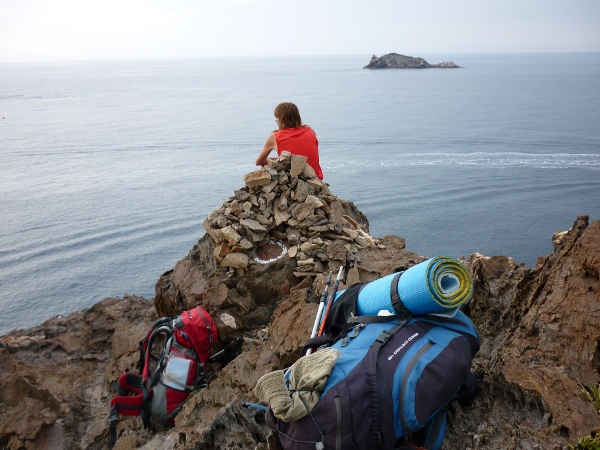
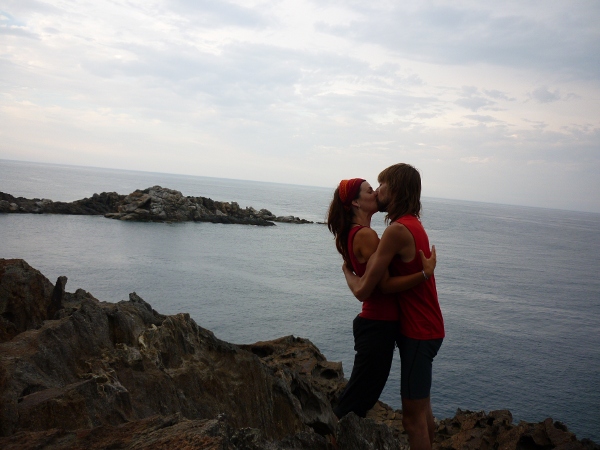 This adventure through GR 11 has been incredibly positive for us for
several reasons. We've learned a lot about ourselves and strengthened our
relation, and now I know how powerful drive can be; to get somewhere, no
matter how far, it's really easy if you just believe you can do it and
desire to get there.
Maria and I are proud of what we've done, and no wonder we're looking
for new challenges. An obvious one would be repeating this experience,
going through the French side of the Pyrenees, but for now, the Corsican
GR 20 seems the most appealing. We'll see, next summer!
This adventure through GR 11 has been incredibly positive for us for
several reasons. We've learned a lot about ourselves and strengthened our
relation, and now I know how powerful drive can be; to get somewhere, no
matter how far, it's really easy if you just believe you can do it and
desire to get there.
Maria and I are proud of what we've done, and no wonder we're looking
for new challenges. An obvious one would be repeating this experience,
going through the French side of the Pyrenees, but for now, the Corsican
GR 20 seems the most appealing. We'll see, next summer!
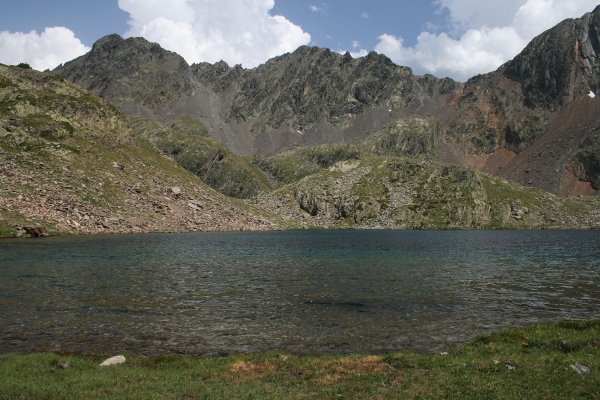
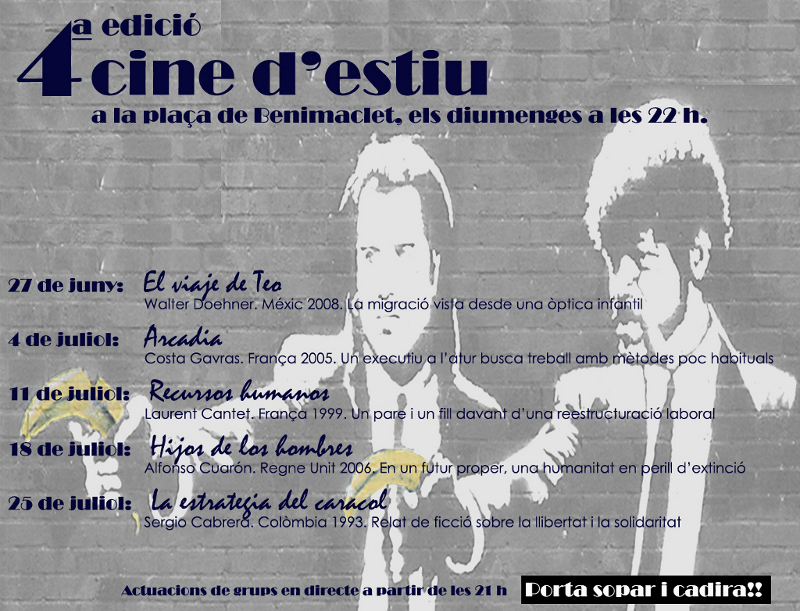
 Various people observed in a
Various people observed in a 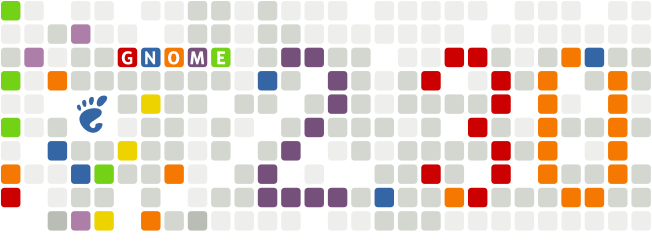
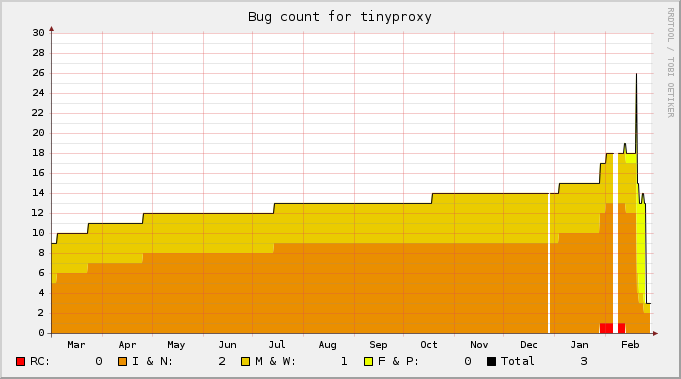 They were happy to get a few bugs and patches forwareded upstream, and
asked me why all of this hadn't happened before. Pitty is that a few
longstanding issues were well known in Debian but not so obvious for the new
upstream maintainers, and are present in 1.8.0. Hopefully all will be
dealt with in 1.8.1 or the next major version. The lesson is: if you work on an
apparently abandoned package, after cleaning the mess in your NMU, try to
spend 15 more minutes trying to contact upstream (if available), pointing
them at the patch tracker and our list of bugs: chances are many are still
useful. Also, contact the Debian maintainer, and if they ask you to take over,
at least post a RFA so someone else can.
If you're a Tinyproxy user, I'd be happy to hear if the current package in
Debian unstable works for you. If you were having weird issues with 1.6.x,
chances are 1.8 will fix them. The package can be installed on stable
with no extra dependencies, so if you're feeling adventurous, go ahead and
upgrade.
They were happy to get a few bugs and patches forwareded upstream, and
asked me why all of this hadn't happened before. Pitty is that a few
longstanding issues were well known in Debian but not so obvious for the new
upstream maintainers, and are present in 1.8.0. Hopefully all will be
dealt with in 1.8.1 or the next major version. The lesson is: if you work on an
apparently abandoned package, after cleaning the mess in your NMU, try to
spend 15 more minutes trying to contact upstream (if available), pointing
them at the patch tracker and our list of bugs: chances are many are still
useful. Also, contact the Debian maintainer, and if they ask you to take over,
at least post a RFA so someone else can.
If you're a Tinyproxy user, I'd be happy to hear if the current package in
Debian unstable works for you. If you were having weird issues with 1.6.x,
chances are 1.8 will fix them. The package can be installed on stable
with no extra dependencies, so if you're feeling adventurous, go ahead and
upgrade.
 The local government of PP, led by the infamous Rita Barber , knows that
getting the anti-riot police in the neighbourhood and forcing very old men
and women out of the houses where they were born isn't what many people like to
see in the evening news. They also know time is their ally; this plan is
many decades old, and there's no need to hurry now, so it's better to apply
silent mafia tactics on the problem. It's very easy.
First, stop investing a single euro in the area and monitor the slow but
effective results of the degradation. Have a bit of patience, and after
quite a few years, start promoting the illegal occupation of the increasing
number of empty houses by marginal collectives which will bring the associated
introduction of drug dealing in the area. This will surely make even more
people leave or accelerate their decease. Keep repeating this process, until
the Cabanyal is really fucked up. Now, start promoting the rehabilitation
plan , which unavoidably includes splitting the neighbourhood in two
pieces, and destroying a substantial part of it. Hopefully, many of the
neighbours not directly affected by the demolitions will back the plan, they
can't be blamed for being really fed up after all. Do all you can to confront
those in favour to those against. In the meanwhile, start harrassing owners,
make them end up selling their property at ridiculous prices and as soon as
this happens, demolish it very quickly. Don't even bother with cleaning up the
rubble: an increasing number of sites like this all over the place may be
what makes a few more families give up and leave.
In the end, you either have an empty neighbourhood, or you've managed to
demolish all the annoying houses that block your shiny avenue. However, if a
Supreme Court argues that the remaining houses still have some
cultural value, you might want to consider changing your local law to
unprotect those architectural elements.
Today, many thousands of Valencians marched around Cabanyal to say
enough! . From the street, I saw several old women out on the balconies
of their beautiful houses, their eyes wet with tears, while they observed in
silence all that many people who were fighting for them. There's still a long
way to go in the courts until this is all over, but at least these people
have a little more hope today than those in el Carme or La Punta, who ended
up losing similar battles, years ago.
The local government of PP, led by the infamous Rita Barber , knows that
getting the anti-riot police in the neighbourhood and forcing very old men
and women out of the houses where they were born isn't what many people like to
see in the evening news. They also know time is their ally; this plan is
many decades old, and there's no need to hurry now, so it's better to apply
silent mafia tactics on the problem. It's very easy.
First, stop investing a single euro in the area and monitor the slow but
effective results of the degradation. Have a bit of patience, and after
quite a few years, start promoting the illegal occupation of the increasing
number of empty houses by marginal collectives which will bring the associated
introduction of drug dealing in the area. This will surely make even more
people leave or accelerate their decease. Keep repeating this process, until
the Cabanyal is really fucked up. Now, start promoting the rehabilitation
plan , which unavoidably includes splitting the neighbourhood in two
pieces, and destroying a substantial part of it. Hopefully, many of the
neighbours not directly affected by the demolitions will back the plan, they
can't be blamed for being really fed up after all. Do all you can to confront
those in favour to those against. In the meanwhile, start harrassing owners,
make them end up selling their property at ridiculous prices and as soon as
this happens, demolish it very quickly. Don't even bother with cleaning up the
rubble: an increasing number of sites like this all over the place may be
what makes a few more families give up and leave.
In the end, you either have an empty neighbourhood, or you've managed to
demolish all the annoying houses that block your shiny avenue. However, if a
Supreme Court argues that the remaining houses still have some
cultural value, you might want to consider changing your local law to
unprotect those architectural elements.
Today, many thousands of Valencians marched around Cabanyal to say
enough! . From the street, I saw several old women out on the balconies
of their beautiful houses, their eyes wet with tears, while they observed in
silence all that many people who were fighting for them. There's still a long
way to go in the courts until this is all over, but at least these people
have a little more hope today than those in el Carme or La Punta, who ended
up losing similar battles, years ago.

